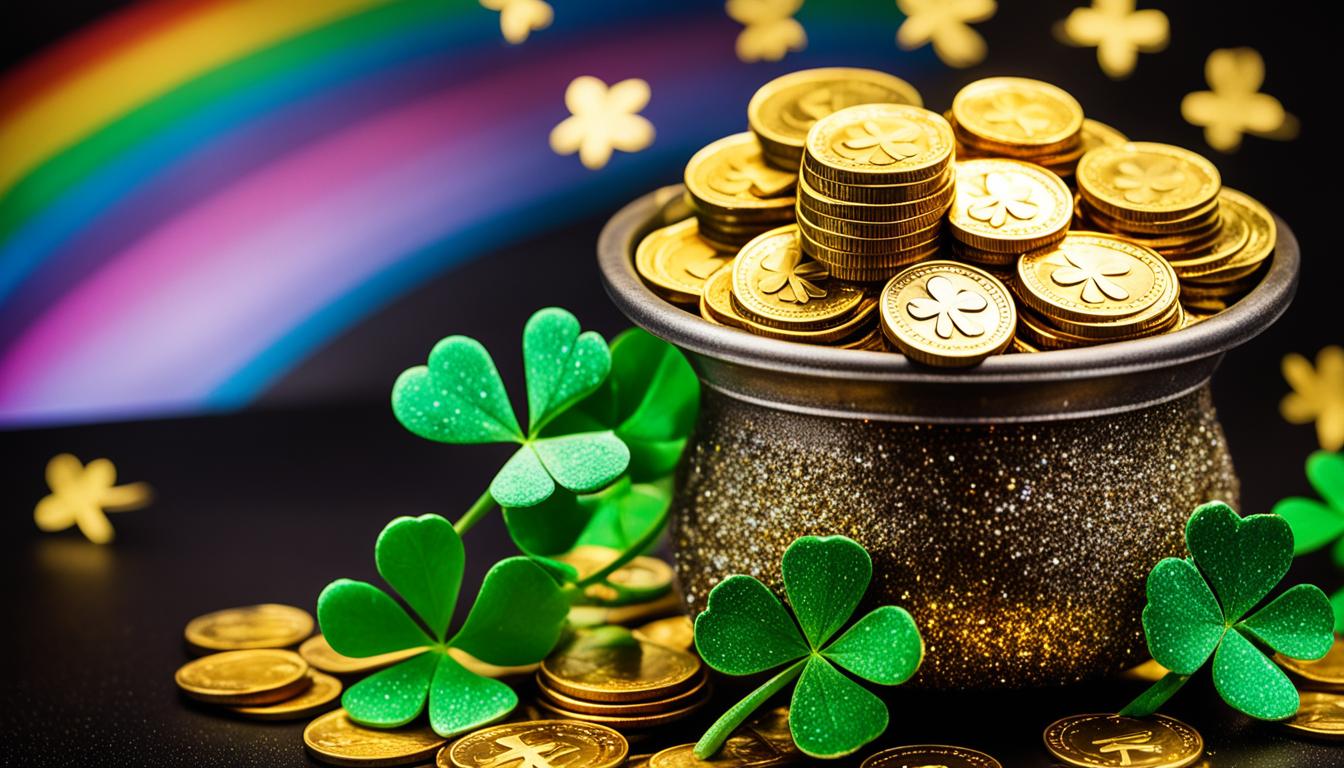Originally posted on January 24, 2024 @ 7:44 am
Luck money, also known as lucky money or red envelope money, is a cultural tradition that has its roots in various Asian cultures, including China, Vietnam, and other countries that celebrate Lunar New Year. It is a monetary gift given to family and friends during special occasions, such as weddings, birthdays, and most commonly, Lunar New Year.
Key Takeaways:
- Luck money is a cultural tradition with roots in various Asian cultures.
- It is a monetary gift given during special occasions like Lunar New Year.
- Luck money symbolizes good luck and prosperity.
- Red envelopes are used to give luck money.
- The tradition of luck money is deeply ingrained in Asian communities.
Traditions and Customs of Luck Money
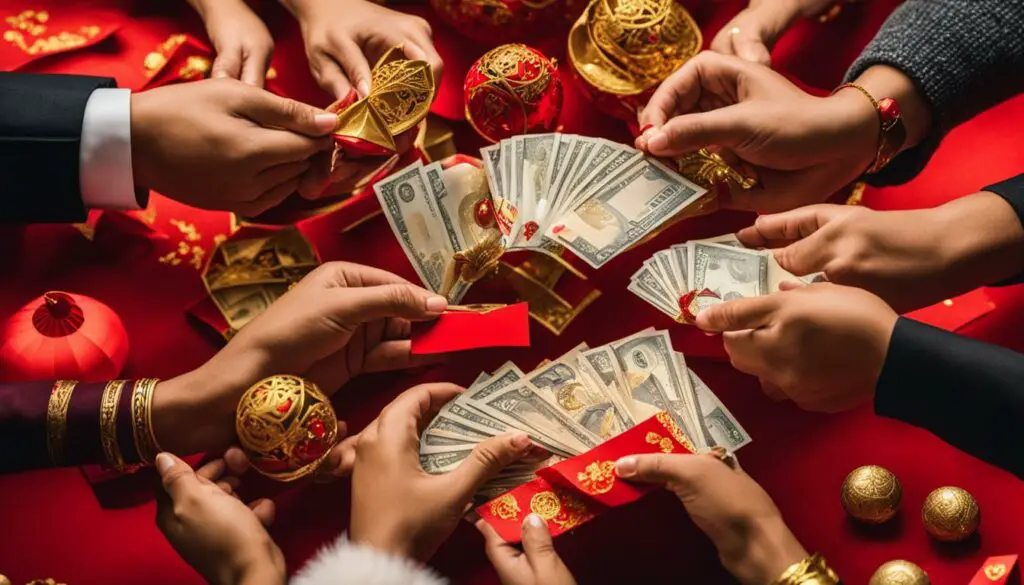
The tradition of luck money is deeply rooted in various customs and traditions, and it holds significant cultural significance. It is considered a gesture of good fortune and blessings for the recipient, symbolizing the hope for prosperity and happiness. Let’s explore some of the traditions and customs associated with luck money:
The Color of Luck
The red color of the envelope plays a vital role in the tradition of luck money. Red is believed to symbolize luck, joy, and prosperity, while also warding off evil spirits. It is customary to use vibrant red envelopes when giving luck money, adding to the auspiciousness of the occasion.
The Significance of Even Numbers
When it comes to the amount of money given in luck envelopes, even numbers hold great significance. Odd numbers are traditionally associated with funeral rituals, so even numbers are preferred to symbolize happiness and good luck. Common amounts given include $10, $20, or other multiples of even figures, with larger sums reserved for more important events or relationships.
Blessings for the New Year
During Lunar New Year celebrations and other auspicious occasions, it is customary to give luck money to children and unmarried relatives. This act of giving serves as a way to bless and wish them good luck for the coming year, ensuring their well-being and prosperity. The practice also fosters a sense of community, love, and support among family members.
Strengthening Family Bonds
The act of giving and receiving luck money is not only about financial blessings but also about strengthening family bonds. It creates an emotional connection between the giver and the recipient, reinforcing the sense of love, care, and community within the family. This tradition fosters a spirit of generosity and kinship, celebrating the importance of family ties.
Quotes
“The tradition of luck money beautifully exemplifies the cultural significance of sharing blessings and good fortune within Asian communities.” – [Author]
Overall, traditions and customs associated with luck money emphasize the cultural significance of this practice. The act of giving luck money goes beyond the monetary value – it represents the desire to spread joy, auspiciousness, and a sense of togetherness, highlighting the importance of love, blessings, and family ties in our lives.
| Tradition | Significance |
|---|---|
| The red color of the envelope | Symbolizes luck, joy, and prosperity; wards off evil spirits |
| Even numbers | Associated with happiness and good luck; preferred over odd numbers |
| Blessing the new year | Wishing good luck and prosperity to children and unmarried relatives |
| Strengthening family bonds | Fosters a sense of love, care, and community within the family |
By upholding these traditions and customs, Asian communities continue to honor their cultural heritage, cherish family values, and pass on these blessings to future generations.
Origins of Luck Money

The tradition of luck money has fascinating origins rooted in ancient Chinese legends and folklore. According to one legend, villagers faced a formidable creature known as Nian, which would emerge on the eve of the Lunar New Year to cause havoc and destruction among the community and their livestock. However, the villagers discovered that Nian was afraid of the color red and loud noises.
In a bid to protect themselves, they hung red decorations and set off firecrackers, successfully scaring away the fearsome creature. This pivotal event laid the foundation for the tradition of giving red envelopes filled with money as a gesture to bring good fortune and ward off evil spirits. As time went on, this custom spread to other Asian cultures, becoming deeply ingrained in their traditions and symbolizing a meaningful way to honor the past and bless future generations.
The Nian Legend
Legend has it that villagers discovered the mythical beast Nian’s fear of the color red and loud noises. Their ingenious tactics of hanging red decorations and setting off firecrackers became the cornerstone of the tradition of luck money.
As the practice of giving luck money continues to be passed down through generations, it serves as a powerful reminder of the enduring strength of cultural traditions and the importance of embracing the past while embracing the future.
Beliefs and Superstitions Surrounding Luck Money
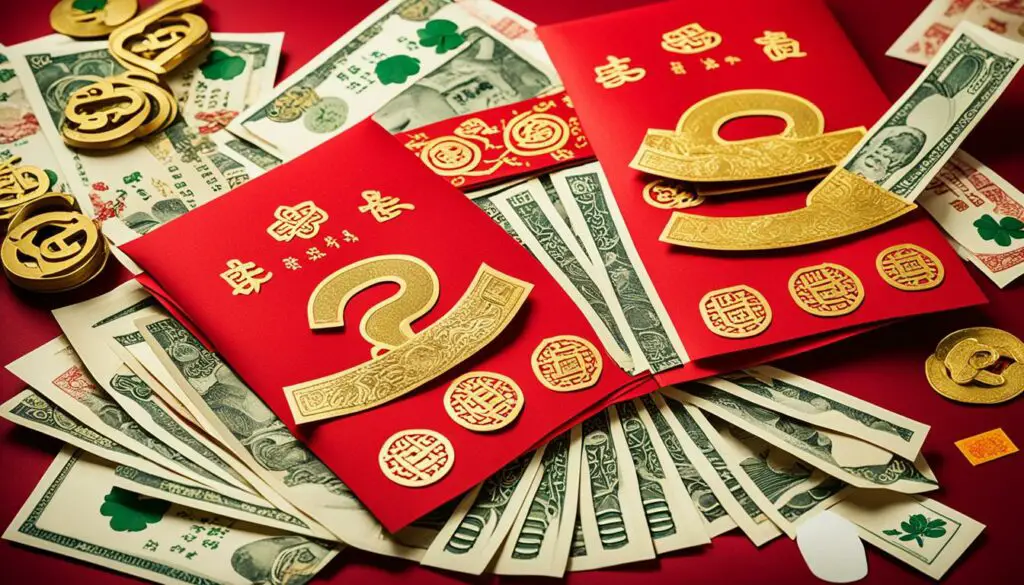
Luck money is not just a cultural tradition; it is also associated with various beliefs and superstitions. These beliefs add an intriguing dimension to the practice of giving and receiving luck money. Here are a few fascinating beliefs and superstitions that surround luck money:
- Don’t spend it immediately: It is believed that the money inside the red envelope should not be spent right away. According to lucky money beliefs, spending the money immediately may bring bad luck. Instead, it is often kept for a certain period of time, allowing the blessings and good fortune to accumulate. Some people save the luck money for something meaningful, while others choose to keep it as a token of abundance.
- Don’t open the envelope in front of the giver: Opening a red envelope in front of the giver is considered disrespectful and may bring ill luck. To avoid any unintended consequences, it is best to open the envelope privately, ensuring that no one observes the process.
- Receiving luck money with both hands: When receiving a red envelope, it is customary to use both hands to show respect and gratitude. This superstition signifies a deep appreciation for the blessings being bestowed. By receiving luck money with both hands, one acknowledges the cultural significance of the tradition and expresses gratitude for the generosity of the giver.
The beliefs and superstitions surrounding luck money add an element of mystery and intrigue to this cherished tradition. They underscore the deep-rooted cultural significance of luck money and demonstrate the importance of honoring customs and blessings.
Beliefs and Superstitions Surrounding Luck Money
| Beliefs and Superstitions | Meaning |
|---|---|
| Don’t spend it immediately | Bringing bad luck |
| Don’t open the envelope in front of the giver | Avoiding disrespect and ill luck |
| Receiving luck money with both hands | Showing respect and gratitude |
Celebrating Lunar New Year with Luck Money
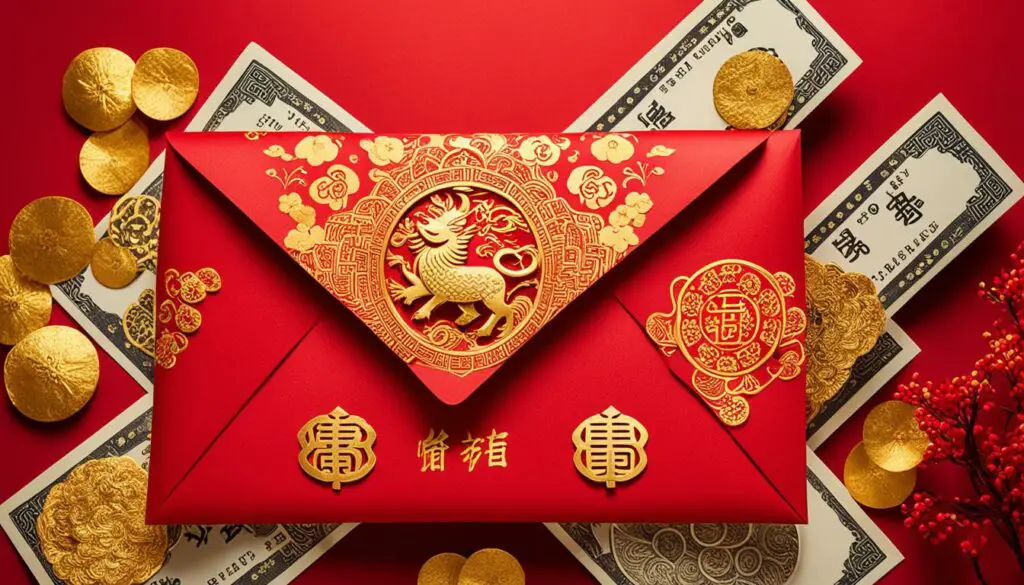
Lunar New Year, also known as the Spring Festival, is a major celebration in many Asian communities. It is a time for families to come together, honor their ancestors, and usher in good fortune for the coming year.
Luck money plays a significant role in these celebrations, with red envelopes being exchanged among family members and friends. The act of giving and receiving luck money is considered a way to share blessings and well wishes for a prosperous year ahead. The amount of money given may vary based on personal relationships and financial means, but the sentiment remains the same – to spread joy and good luck.
In the spirit of Lunar New Year, let’s delve deeper into the customs and cultural significance of luck money and discover the origin of this beloved tradition.
Spreading Blessings Through Generations
The tradition of luck money during Lunar New Year is a way for families to pass on blessings to the younger generations. Through the act of giving and receiving red envelopes, elders express their hopes for the well-being and prosperity of their loved ones, while younger family members receive not only monetary gifts but also the love and support of their elders. It strengthens family bonds and fosters a sense of gratitude and appreciation.
“Lunar New Year is an important time for us as a family. We enjoy the festivities and the opportunity to give luck money to our children and grandchildren. It’s our way of passing on blessings and showing our love for them,” says Mrs. Nguyen, a Vietnamese grandmother living in the United States.
Symbolizing Good Luck and Prosperity
The practice of giving luck money in red envelopes is deeply rooted in the belief that the color red brings good luck and wards off evil spirits. It is believed that red envelopes carry the power to attract positive energy and blessings for the receiver. This symbolism of good luck and prosperity makes the act of giving and receiving luck money during Lunar New Year even more meaningful and cherished.
The Cultural Significance of Luck Money
The tradition of luck money is not limited to financial blessings. It represents a cultural significance that goes beyond monetary value. The act of giving and receiving luck money during Lunar New Year reinforces cultural identity, fosters a sense of community, and strengthens family ties. It serves as a reminder of the values and customs that have been passed down through generations, connecting individuals to their heritage and preserving cultural traditions.
To truly appreciate the cultural significance of luck money, it is essential to understand its origins and the beliefs and superstitions surrounding this beloved tradition.
Contemporary Practices of Luck Money
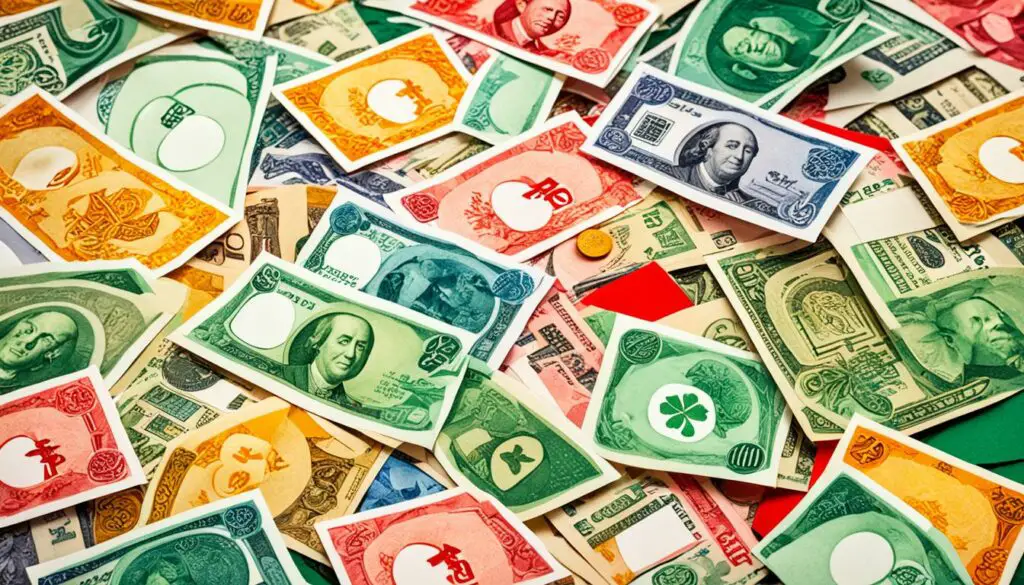
While luck money has deep historical and cultural roots, its practice has evolved over time. Today, it is not only given during Lunar New Year but also on various other occasions, such as weddings, birthdays, and other celebrations. Some families have even incorporated modern twists to the tradition, such as using digital red envelope apps or sending electronic transfers instead of physical envelopes.
Despite these contemporary changes, the cultural significance of luck money remains intact, highlighting the importance of cherished traditions and the desire to bring prosperity and good fortune to loved ones.
One example of the modernization of luck money customs is the use of digital red envelope apps. These applications allow individuals to send virtual red envelopes containing money to their friends and family members. It provides a convenient and modern way to participate in the tradition, especially for those who may be geographically separated.
“I love using the digital red envelope app to send luck money to my nieces and nephews. It’s so much fun, and they get excited when they receive a surprise notification with money inside. It maintains the traditional gesture in a contemporary way,” says Emily, a young professional.
Another contemporary practice is the use of electronic transfers instead of physical envelopes. With the advancement of technology, sending money instantly to loved ones has become effortless. This modern twist allows individuals to maintain the tradition’s cultural significance while adapting to the digital age.
Benefits of Contemporary Practices
The incorporation of modern technology into the practice of luck money has several benefits. It provides a convenient and efficient way to participate in the tradition, especially for those who may have difficulty accessing physical red envelopes. Additionally, digital platforms enable larger sums of money to be easily transferred, allowing for more substantial blessings to be shared.
- Convenient and accessible, especially for distant relatives
- Enables instantaneous money transfers
- Allows for larger sums of money to be shared
- Reduces reliance on physical envelopes
Regardless of the method used, whether traditional red envelopes or digital transfers, the cultural significance of luck money remains. It serves as a heartfelt gesture to bring blessings and good fortune to loved ones, fostering a sense of community, and strengthening family bonds.
The Role of Luck in Financial Success

The concept of luck extends beyond cultural traditions and also has a significant impact on personal finance. Understanding the role of luck in financial success is crucial, as acknowledged by Morgan Housel in his book, “The Psychology of Money.” Housel emphasizes the importance of recognizing the influence of luck in our financial outcomes.
Financial well-being can be greatly affected by external factors such as the timing of economic conditions. This understanding is especially relevant to the practice of giving luck money, as it acknowledges the role that luck and blessings play in one’s financial journey.
By recognizing the role of luck in financial success, we gain a deeper appreciation for the cultural traditions and beliefs associated with luck money. It highlights the interconnectedness between financial fortune and the blessings shared through this tradition.
“Luck is what happens when preparation meets opportunity.”
While personal choices and actions undoubtedly play a role in financial success, luck cannot be ignored. It reminds us that external circumstances and opportunities are essential factors that can significantly influence our financial outcomes.
Embracing the concept of luck in personal finance allows us to recognize both the agency we have over our financial decisions and the forces beyond our control. It encourages humility, gratitude, and a deeper appreciation for the blessings that come our way.
| Luck in Financial Success | Key Points |
|---|---|
| 1. Importance of Luck | Recognizing the role of luck in financial outcomes |
| 2. Timing and Economic Conditions | Understanding how external factors impact financial well-being |
| 3. Connection to Luck Money Traditions | Appreciating the cultural significance of luck money beliefs |
| 4. Embracing Humility and Gratitude | Understanding the influence of luck encourages humility, gratitude, and appreciation for blessings |
Luck money traditions and the recognition of luck’s role in financial success provide valuable insights into the complexity of personal finance. They remind us that while we strive to make informed decisions and work hard towards our goals, external factors and unforeseen opportunities can greatly impact our financial journeys.
The Impact of Luck in Financial Outcomes
Understanding the role of luck in financial outcomes requires a nuanced approach. It is not about solely attributing success or failure to luck but acknowledging that it is an inherent part of the equation. By recognizing this, we gain a more holistic perspective on our financial journeys and cultivate a mindset that embraces both preparation and the unpredictable nature of luck.
The Emotional Significance of Luck Money
Luck money holds a special place in the hearts of both the giver and the recipient, carrying not only financial significance but also deep emotional value. When giving luck money, it becomes an opportunity to express love, generosity, and good wishes to cherished loved ones. Witnessing the joy and appreciation on the recipient’s face brings a sense of happiness and fulfillment to the giver.
The act of receiving luck money holds immense symbolism for the recipient. It goes beyond the financial blessings and represents the love and support of their family and community. It creates a heartfelt sense of belonging and gratitude, fostering emotional connections and reinforcing cultural bonds.
Whether it’s a child receiving luck money on Lunar New Year or a newly married couple starting their journey together, the act of giving and receiving luck money is a powerful way to express affection and nurture strong emotional ties.
The Universal Desire for Luck and Blessings
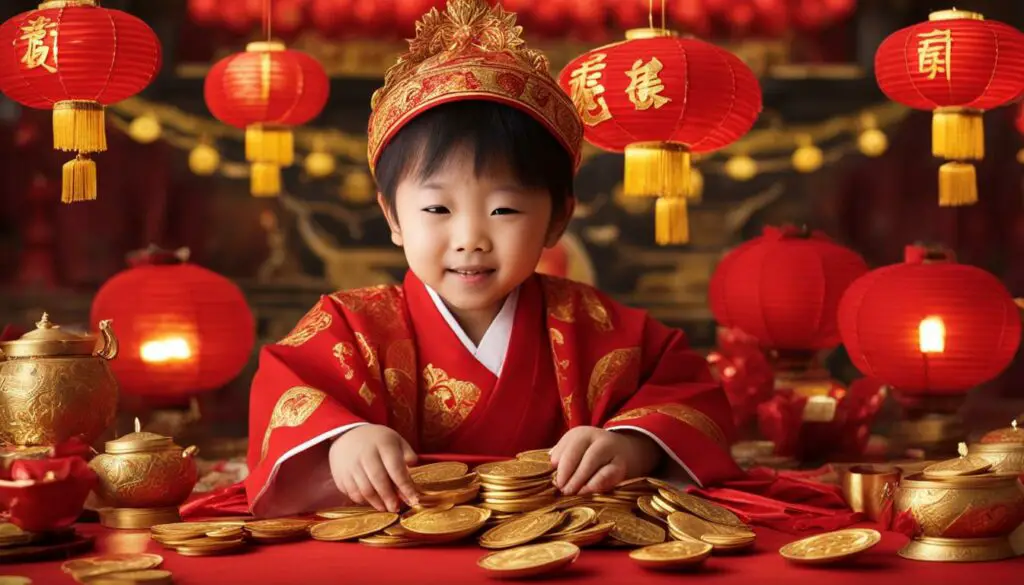
While the practice of luck money may be deeply rooted in specific cultural traditions, the desire for luck and blessings extends far beyond these boundaries. People from all cultures and traditions seek ways to bring good fortune into their lives and the lives of their loved ones. Luck money serves as a tangible representation of this universal desire, encapsulating the collective wish for prosperity, happiness, and well-being.
Across the globe, whether in Asia, Europe, or the Americas, people acknowledge the importance of luck and blessings in their lives. It is a common thread that connects humanity, reminding us of our interconnectedness and the shared pursuit of positive energy. Regardless of cultural background, everyone appreciates the power of luck and the impact it can have on our lives.
The cultural significance of lucky money transcends geographical borders, reminding us of the collective human experience. It reflects our innate desire for abundance, joy, and the well-being of our loved ones. The act of giving and receiving luck money becomes a gesture that goes beyond any cultural divide, creating a sense of unity and shared humanity.
“Luck is what happens when preparation meets opportunity.” – Seneca
The origins of luck money may be rooted in the traditions of specific cultures such as China and Vietnam, but its appeal and relevance resonate with people from all walks of life. The universal desire for luck and blessings reminds us of the common aspirations we share, regardless of our cultural backgrounds.
The Power of Community
When we give luck money, we are not only expressing our own desires for good fortune but also acknowledging the importance of community and the power of collective wishes. It is a way of pooling positive energy, spreading blessings, and creating a sense of harmony among individuals and families.
Cultural Significance and Global Connection
The cultural significance of lucky money serves as a bridge that connects different cultures and traditions. While the customs and practices may vary, the underlying values of prosperity, happiness, and well-being bind us together. This shared understanding allows for a global connection, fostering cultural appreciation and recognition of our collective human experience.
In conclusion, while luck money may have its origins in specific cultural traditions, the universal desire for luck and blessings transcends these boundaries. The practice of giving and receiving luck money is a reflection of our shared aspirations for prosperity and well-being. It reminds us of our interconnectedness and the power of community in creating and sharing positive energy. Regardless of cultural background, luck money serves as a symbol of hope, unity, and our collective pursuit of happiness.
The Future of Luck Money
As traditions evolve and new generations embrace changing lifestyles, the future of luck money may see further adaptations and innovations. However, the core meaning and symbolism behind luck money are likely to endure. The tradition will continue to be a way to honor cultural heritage, strengthen family ties, and pass on well wishes for prosperity and good fortune.
“The future belongs to those who carry forward their traditions with pride and adapt them to the changing times.”
Whatever form it may take in the future, luck money will remain a cherished tradition that transcends cultural boundaries and brings people together in celebration.
| Luck Money Customs | Meaning of Luck Money | Luck Money Traditions | |
|---|---|---|---|
| 1 | Adapting to digital platforms | Symbol of good luck and blessings | Exchanging red envelopes during Lunar New Year |
| 2 | Customizing the design of red envelopes | Honoring cultural heritage | Passing down luck money to future generations |
| 3 | Integrating luck money into weddings and birthdays | Strengthening family bonds | Spreading well wishes for prosperity |
As we look to the future, it is exciting to witness the evolution of luck money customs and traditions. The universal desire for luck and blessings will continue to drive this cherished practice, ensuring that luck money remains a symbol of hope, happiness, and prosperity for generations to come.
Conclusion
Luck money, a cultural tradition deeply rooted in various Asian cultures, holds significant cultural significance. It represents good luck, prosperity, and blessings, and is typically given in vibrant red envelopes during special occasions like Lunar New Year, weddings, and birthdays. The customs and beliefs surrounding luck money emphasize its role in fostering a sense of community, strengthening family bonds, and spreading joy.
Moreover, understanding the interplay between luck and financial success adds another layer of appreciation for this centuries-old tradition. Recognizing that external factors can influence our financial outcomes underscores the importance of embracing traditions like luck money that acknowledge the role of luck and blessings in our lives.
Regardless of cultural backgrounds, the universal desire for luck and blessings resonates across cultures and communities worldwide. Luck money serves as a tangible representation of this widespread aspiration for prosperit
FAQ
What is luck money?
Luck money, also known as lucky money or red envelope money, is a monetary gift given to family and friends during special occasions, such as weddings, birthdays, and most commonly, Lunar New Year. It is often given in red envelopes and symbolizes good luck, prosperity, and blessings for the recipient.
What is the cultural significance of luck money?
Luck money has deep cultural significance in various Asian cultures. It is a way to strengthen family bonds, foster a sense of community, and pass on well wishes for prosperity and good fortune. Luck money is also associated with customs and beliefs that highlight its role in bringing blessings and warding off evil spirits.
Where did the tradition of luck money originate?
The tradition of luck money originated in ancient Chinese legends and folklore. It was believed that giving red envelopes filled with money would bring good luck and scare away evil spirits, particularly during the Lunar New Year celebration. Over time, this practice spread to other Asian cultures and became deeply ingrained in their traditions.
What are some customs and traditions associated with luck money?
The customs and traditions of luck money include giving red envelopes, using even numbers for the amount of money given, and giving the envelopes with both hands as a sign of respect. It is also customary to give luck money to children and unmarried relatives, as a way to bless and wish them good luck for the coming year.
What are some beliefs and superstitions surrounding luck money?
Some beliefs and superstitions surrounding luck money include not spending the money immediately to avoid bad luck, not opening the envelope in front of the giver to show respect, and keeping the money for a certain period of time before using it. These beliefs highlight the symbolic and sacred nature of luck money.
How is luck money celebrated during Lunar New Year?
Lunar New Year is a major celebration in many Asian communities, and luck money plays a significant role in these festivities. Red envelopes filled with money are exchanged among family members and friends as a way to share blessings and well wishes for a prosperous year ahead.
How has the practice of luck money evolved over time?
While the core meaning and symbolism of luck money remain intact, the practice has evolved with modern times. Some families now use digital red envelope apps or send electronic transfers instead of physical envelopes. However, the cultural significance of luck money as a way to honor traditions and pass on blessings remains unchanged.
What is the role of luck in financial success?
Understanding the role of luck is important in financial success. External factors, such as the timing of economic conditions, can significantly impact one’s financial well-being. Recognizing the role of luck can provide a deeper appreciation for the tradition of giving luck money and the desire to bring prosperity and good fortune to loved ones.
What is the emotional significance of luck money?
Luck money holds emotional value for both the giver and the recipient. For the giver, it is a way to express love, generosity, and good wishes to their loved ones. For the recipient, receiving luck money symbolizes not only financial blessings but also the love and support of their family and community. It creates a sense of belonging and gratitude.
Why is there a universal desire for luck and blessings?
The desire for luck and blessings is universal because people across cultures and traditions seek ways to bring good fortune into their lives and the lives of their loved ones. Luck money serves as a tangible representation of this desire, connecting generations and cultures in the pursuit of prosperity, happiness, and well-being.
What does the future hold for luck money?
The future of luck money may see further adaptations and innovations as traditions evolve and new generations embrace changing lifestyles. However, the core meaning and symbolism behind luck money are likely to endure. It will continue to be a cherished tradition that honors cultural heritage, strengthens family ties, and spreads joy and good luck.
